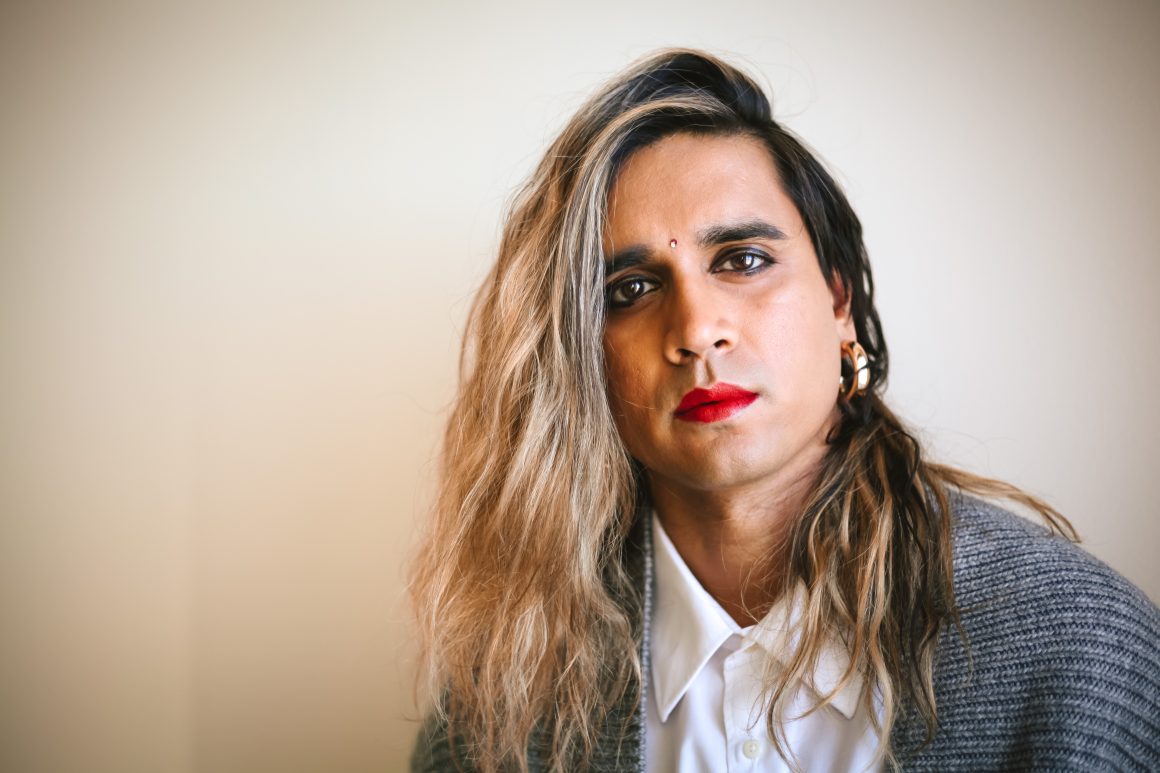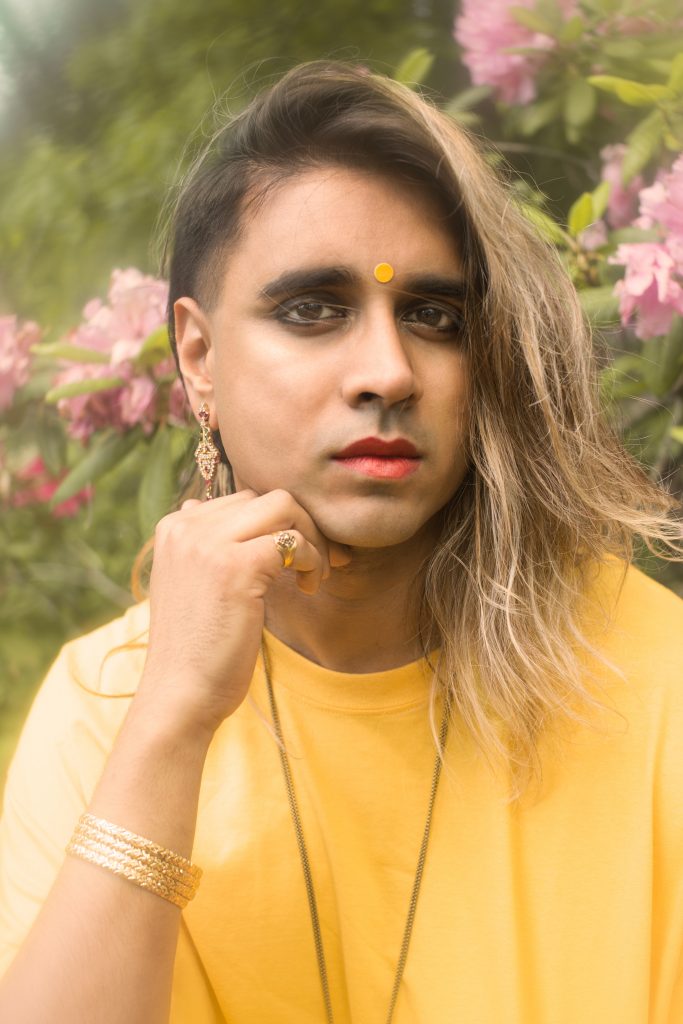
University of Calgary English professor talks identity and art
By Tina Shaygan, January 25 2018 —
University of Calgary professor Vivek Shraya is an artist, musician and writer. As an openly transgender artist, she has made her mark on Canadian art and beyond. We sat down with Shraya to talk about her art, why she is focusing on Indigenous and writers of colour in her class and why she doesn’t credit her successes to her undergraduate experience at the University of Alberta.
The Gauntlet: Tell me a little bit about yourself and your background.
Vivek Shraya: I’m an artist and I’m also an assistant professor here at the University of Calgary, department of English, creative writing. This semester I’m teaching an intro to science fiction class, ENGL 393.
Gauntlet: I was looking through the course outline and I noticed that you’re primarily reading books by Indigenous authors, black writers and writers of colour.
Shraya: My education experience in Canada was one where I didn’t encounter, to my knowledge, a book by an author of colour until I was in third-year university. All of elementary school, all of junior high, high school, I was mostly taught white texts by white authors. I’m really passionate about visibility and representation, especially in post-secondary contexts. Like a lot of other genres in English, sci-fi and conversations around sci-fi have often been dominated by white authors so it felt really important to centre Indigenous writers, black writers and writers of colour.
Gauntlet: What has been the student reception to this?
Shraya: So far, so good, I think. My sense is some of the information and some of the content is new. Right now, we’re doing an anthology called Love Beyond Space and Time. It’s an Indigenous anthology of science fiction. We just did a response paper and a lot of the students commented how this is some of their first encounters with Indigenous writing. Again, I finished my university undergrad in 2003 and to me, the fact that however many years later, these students are still for the first time encountering Indigenous writing is really upsetting. But what’s exciting is how many of them are so receptive and excited about it and are challenging their own ideas about Indigenous culture and science fiction. I see it as an adventure that we’re all on together and I’m curious how the class is going to keep on going.

Photo by Nick Wong
Gauntlet: What do you think students miss out on when they only read science-fiction texts by white authors?
Shraya: Everything. It’s interesting, we started the class with a book by Jomny Sun, who was actually born and raised here in Calgary. It’s a graphic novel called Everyone’s a Aliebn When Ur a Aliebn Too. What’s unique about it is that so often in sci-fi, there’s an alien invasion and it’s about how humans interact with the alien. The alien is the other and often the other can symbolize people of colour. But what’s interesting about Sun’s book is that the alien is the protagonist and humans are the other so we get to see humans through the lens of the alien. I think that that switch is tied to his experience as an Asian Canadian.
Gauntlet: You’ve also worked on films, albums and books. What are some of the themes in your art?
Shraya: I’m really passionate about challenging dominant narratives, whatever they might be. Obviously, queerness is something that comes up a lot in my work. Gender comes up a lot in my work and race comes up a lot in my work. I’m constantly interrogating what the dominant idea of queerness is and how do we challenge it. What is the dominant idea of brownness and how do we challenge it? My first novel, She of the Mountains, is a bisexual love story. Within queerness, bisexualness is erased and bisexual stories are not seen as legitimate. That’s one example of how I feel passionate in my art about challenging dominant narratives.
Gauntlet: I noticed that you don’t want to be tied to the institution you did your undergrad at. Do you mind talking about that?
Shraya: You know, it’s hard because when people find out you are a writer and then they find out you majored in English, then they tend to credit the institution. I went to the University of Alberta and my creative writing teacher there actually told me I was one of the worst writers in his class.
But it’s interesting because I had two formative experiences — I had an English teacher at the U of A who I felt was really one of the first instructors who saw me. It was because of him that I majored in English. But then, after that, I took this creative writing class, and I had this teacher who had literally lectured me for an hour, telling me what a terrible writer I was. That last experience really changed me. That’s one of the reasons why, especially when people find out I’m a writer, I don’t like saying I majored in English because it feels like giving the institution credit, but I don’t know if they deserve it.
Gauntlet: If a student at the University of Calgary right now going through a similar experience that you did at the University of Alberta, what would you say to them?
Shraya: For me, when I had that experience I was so demoralized. Now that I’m on the other side of the administration, I feel like if a student has that encounter with a professor, I would recommend them talking to the chair because I think that students have so much power. I felt very disempowered, but I think if a student were to give that feedback to the chair of the program, I think that it could be very valuable. I am a champion for learning and school, but simultaneously I’m such a champion for DIY approaches. I think that there’s a lot of work that I made that I wasn’t formally taught. At the end of the day, there are things about being an artist that just require exploration and dedication to your craft. So again I say take what you can from the institution, but also make sure you are developing your craft outside the institution. 
Photo by Maxwell Lander
Gauntlet: You’ve also worked with Tegan and Sara?
Shraya: I did. We’re super good friends. We met in 2003 and since then we’ve toured together a couple times. We went to India together. They’ve been on a couple of my albums. Tegan was in one of my films, What I LOVE about Being QUEER. Recently, they put out The Con cover project and they had me cover one of their songs. They’re a huge inspiration for me.
Shraya: I’m actually really loving Calgary. My experience of growing up in Edmonton, outside the institution, was not a good one. I encountered a lot of homophobia and genderphobia and that is one of the reasons I left and was living in Toronto for 15 years. But so far I’m actually really, really loving it. And everyone at the institution has been very enthusiastic. It’s still early days [at the U of C], so I’m still trying to find my footing. That might take some time, but I hope that I am able to help and support the career of young budding writers, especially writers of colour and queer writers and their practice. I also don’t know how many students have had a trans teacher before. Again, thinking about my own educational experience, having a transgender teacher would have made a tremendous difference in my relationship to my own queerness. I’m excited to be trans in the classroom — even if we’re not talking about trans-specific issues, I think that there is an important value to what that means.
Shraya’s band with her brother, Too Attached, is releasing their second album called Angry on Feb. 1. As part of the launch, there will be a show at Nite Owl presented by Femme Wave on March 3.
Interview edited for clarity and brevity.
